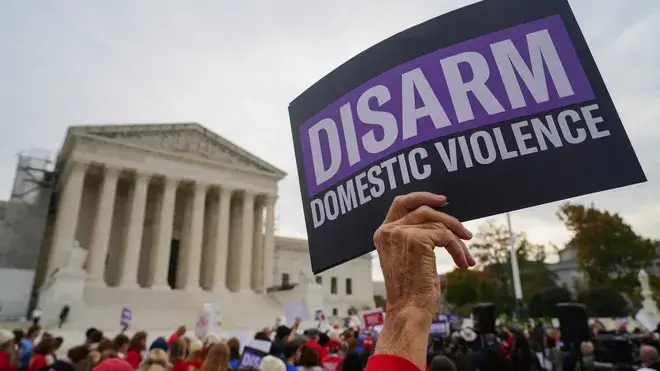|
LISTEN TO THIS THE AFRICANA VOICE ARTICLE NOW
Getting your Trinity Audio player ready...
|
The Supreme Court Friday ruled that individuals under restraining orders for domestic violence do not have the right to own guns. The 8-1 decision upholds a 30-year-old law that prohibits those with restraining orders for domestic abuse from possessing firearms. This case centered on Zackey Rahimi, a Texas man indicted under the 1994 law who appealed his conviction after the Supreme Court expanded gun rights in a 2022 ruling.
In the 2022 ruling, the court declared that the U.S. Constitution’s guarantee of the right “to keep and bear arms” protects a broad right to carry a handgun outside the home for self-defense and established a new test for gun laws based on “historical tradition.” Rahimi argued that the 1994 law did not meet this new test and appealed his case to the Supreme Court.
Rahimi’s lawyer, James Matthew Wright, argued that there was no historical precedent for disarming individuals except those convicted of a felony, which does not include subjects of restraining orders. The U.S. government countered that “dangerous” individuals, such as loyalists to Britain during the American Revolutionary War, had been disarmed in the past. The government’s lawyer also highlighted that women living with armed domestic abusers are five times more likely to be murdered.
Rahimi, 23, is a small-time drug dealer serving a six-year sentence in a Texas federal prison and awaiting a state trial. His ex-girlfriend was granted a restraining order in 2020 after he assaulted her and shot at a bystander. Despite the restraining order, Rahimi kept his weapons and was involved in five public shootings later that year. In a letter from jail, he promised to “stay away from all firearms and weapons” upon his release.
Chief Justice John Roberts delivered the court’s opinion, stating that individuals who pose a credible threat to the physical safety of an intimate partner may be banned from possessing firearms consistent with the Second Amendment. Justice Clarence Thomas was the lone dissenter.
This ruling is the Supreme Court’s first Second Amendment case since expanding gun rights in 2022. The justices reversed a federal appeals court ruling from New Orleans that had struck down the 1994 law.
The case drew significant attention, particularly regarding its potential impact on other gun ownership laws, including the high-profile prosecution of Hunter Biden for lying on a form to buy a firearm while addicted to drugs. The ruling also comes amid increased scrutiny of gun laws following a series of high-profile mass shootings.
Rahimi’s case reached the Supreme Court after prosecutors appealed a ruling that overturned his conviction for possessing guns while under a restraining order. Rahimi had been involved in multiple shootings in Arlington, Texas. When police searched his home, he admitted to having guns despite the restraining order.
Advocates for domestic violence victims and gun control groups urged the court to uphold the law, emphasizing the deadly impact of firearms in domestic violence situations. According to the Centers for Disease Control and Prevention, firearms are the most common weapon used in homicides involving intimate partners and family members, with guns used in over half of such killings in 2020.
Gun rights groups supported Rahimi, arguing that historical precedent did not justify the gun ban.
Kaspersky Denies Security Threat Allegations After U.S. Software Ban
U.S- The cybersecurity firm Kaspersky has denied being a security threat after the U.S. Commerce Department banned the use of its software in the United States. The Moscow-based company, led by CEO Eugene Kaspersky, stated that the decision would not impact its ability to sell and promote its cybersecurity products and training in the U.S.
Kaspersky claimed the government’s decision was based on “geopolitical climate and theoretical concerns” rather than any independently verified risk. The U.S. government argues that Kaspersky’s Russian connections pose an “undue or unacceptable risk to U.S. national security or the safety and security.” The Commerce Department’s decision, dated June 14, was posted on the Federal Register.
The department noted that Eugene Kaspersky, as a Russian citizen residing in Russia, is subject to Russian law. It stated that Kaspersky’s software could be exploited to access sensitive data of U.S. citizens, potentially making it available to Russian government actors. The decision emphasized that the concern was not about the effectiveness of Kaspersky’s products in identifying malware, but about the potential strategic harm they could cause to the United States.
Kaspersky, known for its popular consumer antivirus products and a research unit respected for exposing elite hacking groups, has faced scrutiny in the past. In 2019, the Associated Press reported that an undercover operative had targeted several cybersecurity experts to gather intelligence on critics of Kaspersky.
The company insists it cannot deliberately obtain sensitive data on Americans and that its operations in Russia can only access aggregate or statistical data, not attributable to specific individuals. Kaspersky argued that the U.S. government’s decision would ultimately benefit cybercriminals and limit consumers’ and organizations’ freedom to choose their preferred cyber protection.
“We look forward to what the future holds, and will continue to defend ourselves against actions that seek to unfairly harm our reputation and commercial interests,” Kaspersky said in its statement.











LEAVE A COMMENT
You must be logged in to post a comment.